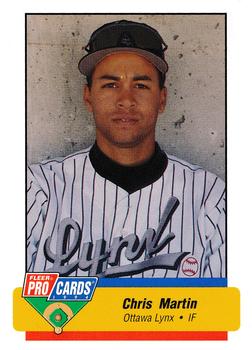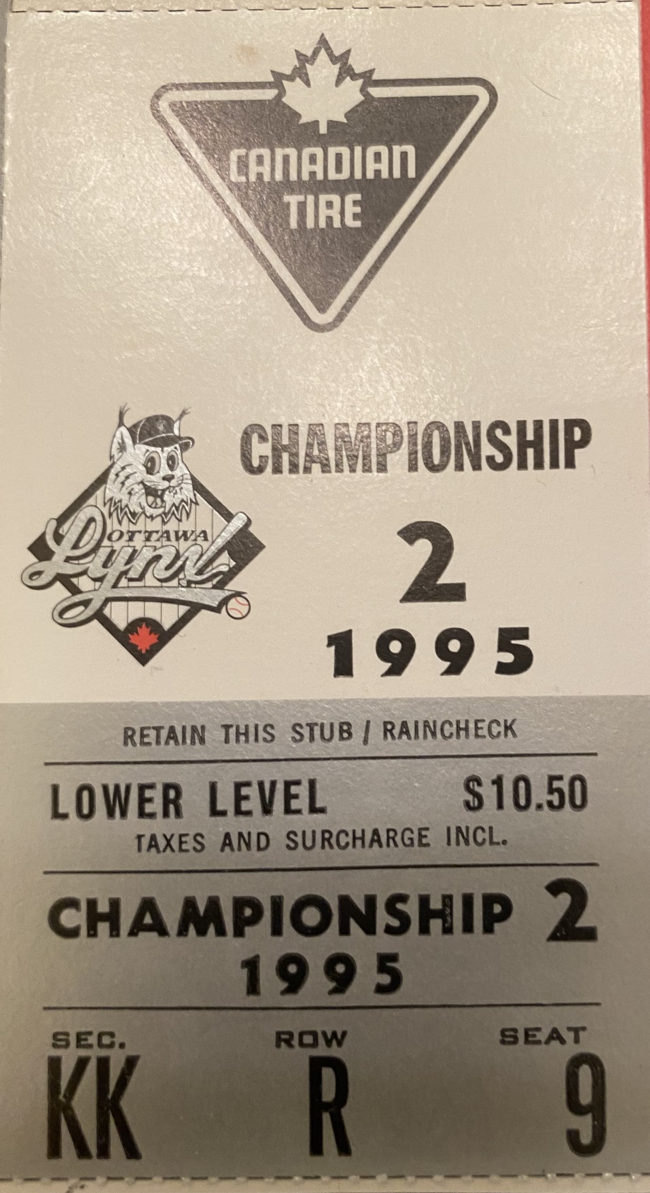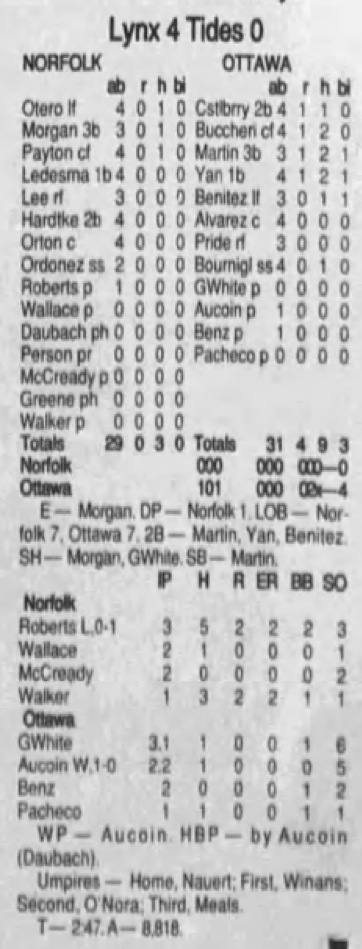September 13, 1995: Ottawa Lynx win International League championship
 On September 13, 1995, in front of 8,818 fans, the Ottawa Lynx, the Triple-A farm team of the Montreal Expos, hosted the Norfolk Tides, the New York Mets’ affiliate, in Game Four of the Governors’ Cup Finals. Ottawa had reached the finals by defeating the Rochester Red Wings three games to two in the East Divisional series, and Norfolk had defeated the Richmond Braves three games to two in the West Divisional series.
On September 13, 1995, in front of 8,818 fans, the Ottawa Lynx, the Triple-A farm team of the Montreal Expos, hosted the Norfolk Tides, the New York Mets’ affiliate, in Game Four of the Governors’ Cup Finals. Ottawa had reached the finals by defeating the Rochester Red Wings three games to two in the East Divisional series, and Norfolk had defeated the Richmond Braves three games to two in the West Divisional series.
Ottawa led the best-of-five championship series two games to one, having split the first two games in Norfolk, winning the first game, 4-2, and losing the second, 2-1, and winning Game Three in Ottawa, 3-2.
The Lynx’ getting to the verge of the International League championship could be described as, using the words of manager Pete Mackanin, “entirely improbable”1 on so many levels. After the Ottawa Athletics left in 1955, Canada’s capital city was without a team until 1993.2 At the start of the 1995 season, the Ottawa roster had five players who did not even play during the 1994 season.3 During the season Ottawa was tied for the lowest batting average in the IL and was eighth in the 10-team league in runs per game and ninth in slugging percentage. As for the pitching, which was the strength of the team at the start of the season, the Lynx had three starters and three relievers called up to Montreal during the season. The six pitchers had an aggregate 32-16 record for the Lynx.4
In contrast to the Tides, who finished 30 games above .500 and won the West Division by 10½ games over second-place Richmond, the Lynx had to battle to the end, clinching a playoff berth on the next to last day of the season. They came in second in the East Division at 72-70, one game behind the first-place Red Wings and 1½ games ahead of the Pawtucket Red Sox.
When Ottawa split the first two games of the best-of-five divisional series at home and then lost the first one in Rochester, it looked as if the season would end – as it had the only other time the Lynx were in the playoffs (1993) – with a loss in the first round. But Ottawa won the next one in Rochester, 8-3. In the decisive Game Five, the Lynx scored three runs in the top of the ninth to overcome a one-run deficit and advance to the finals.
The key blow in that ninth inning was a two-run single by Bert Heffernan. The 30-year-old Heffernan, who had quit baseball before the 1994 season and gone back to college, started the year as an Expos “replacement player” during spring training of 1995, when major-league players were on strike, was assigned as an Ottawa player-coach after the strike was settled. He was activated full-time as a backup catcher in June, and hit just .216 in 36 games.5 It was reported that after the series Lynx pitching coach Chuck Kniffin, who had to go to Colorado to be with his ill mother, left a voice message along these lines: “Congratulations. I don’t know how you guys have got this far.”6
Given its regular-season performance, Norfolk looked as if it would breeze through the playoffs. Call-ups to the major leagues, including the IL Most Valuable Player (Butch Huskey) and Most Valuable Pitcher and Rookie of the Year (Jason Isringhausen), had left the Tides of September a different team than the Tides of mid-summer.7 The Tides had a tough divisional series, as Richmond won 7-6 at Norfolk in Game Four to push the series to five games. But Norfolk prevailed at home, 5-0, with Paul Wilson, the number-one pick in the June 1994 amateur draft, pitching an eight-hit shutout.
The Lynx starting pitcher in Game Four was 23-year-old left-hander Gabe White, who had pitched for Ottawa in parts of each of its three seasons. In his two previous playoff starts, he had an ERA of 12.27 and lasted only a total of 3⅔ innings. Norfolk started 24-year-old left-hander Chris Roberts, making his first appearance in the playoffs. He previously had good seasons at both Class A and Double A but struggled with Norfolk during the 1995 regular season, finishing 7-13 with a 5.52 ERA.
Norfolk was without top outfield prospect Alex Ochoa for Game Four. Ochoa, acquired by the Mets from the Baltimore Orioles in the Bobby Bonilla trade on July 28, was hitting .360 and was second on the team in RBIs with four in the playoffs. In Game Three he jammed his left hand while sliding into home plate.8
The Lynx started off quickly when third baseman Chris Martin’s double down the right-field line scored second baseman Kevin Castleberry for a 1-0 lead. The Lynx loaded the bases with one out in the first, but a strikeout by catcher Clemente Álvarez and a groundout by right fielder Curtis Pride got Norfolk out of the inning.
Meanwhile, White did not give up his first hit, a single by third baseman Kevin Morgan,9 until one out in the top of the fourth, after which the game was delayed by rain for 55 minutes. White did not come back after the delay, so he finished up his night with 3⅓ innings pitched, giving up just the one hit, with six strikeouts and one walk. Right-hander Derek Aucoin replaced him after the delay and got out of the inning without giving up a run.10
In the bottom of the inning, Roberts was ineffective and left the game with two men on and no outs. Right-hander Derek Wallace came in and limited the damage to one run, first baseman Julian Yan scoring on a double play, but the Lynx were ahead, 2-0.
The Tides’ first real threat came in the top of the sixth. Brian Daubach batted for Wallace and was hit in the head with a pitch. Leadoff man and left fielder Ricky Otero followed with a single. With men on first and second, Morgan sacrificed, putting two men in scoring position. Aucoin struck out center fielder Jay Payton and first baseman Aaron Ledesma to end the inning.
The game was being played in steady rain, which again delayed action in the seventh, this time for 45 minutes. Left-hander Jake Benz came on for Ottawa in the seventh and pitched two hitless innings, striking out two and walking one. In the bottom of the eighth, Norfolk brought in right-handed Pete Walker, relieving Jim McCready, who had pitched two scoreless innings. Yan and left fielder Yamil Benítez hit back-to-back-to-back doubles to score two runs and provide a 4-0 cushion.
In the top of the ninth, Ottawa brought in 22-year-old right-hander Álex Pacheco, who had not allowed an earned run in three playoff appearances after spending most of the season in Double A.11 Despite giving up a leadoff single to Payton and walking a batter, Pacheco completed the shutout and secured the playoff championship for the Lynx.
Aucoin was credited with the win and Roberts was charged with the loss. Aucoin became the sixth Lynx pitcher with a win in the playoffs. Lynx pitchers struck out 14, their season high, while surrendering just three hits.
The three Ottawa RBIs came from Yan, Martin, and Benitez. Yan led the Lynx in the playoffs with 8 RBIs (despite batting just .222) while Martin batted .364 while contributing 7 RBIs and Benitez was third on the team with 5 RBIs (batting .204). The total time from the start of the game to the finish was 4 hours and 27 minutes, including 100 minutes of rain delay.12
The question was how a team with more “replacement players” than prospects, a team characterized as mostly “journeymen, hopefuls, misfits and diehards,”13 pulled it off. A major factor was the masterful job Mackanin did in maximizing the abilities of the “potpourri” of talent he had, especially over the two weeks of the playoffs. Even though Norfolk manager Toby Harrah was named the International League Manager of the Year after the regular season, Mackanin was named the 1995 Minor League Manager of the Year by The Sporting News in November.14
In Mackanin’s mind the answer was simple: “I have never seen a team that wanted it so bad. … [T]hey had a tremendous desire to win. That’s an intangible you can’t teach.”15 Perhaps the best explanation came from a fan at the game who, while talking specifically about catcher Álvarez, had an apt description of the entire team. “He can’t hit, but he puts a lot of spirit in it.”16
Unfortunately for Ottawa fans, after 1995 the team made the playoffs only one other time (an opening-round loss in 2003) before leaving after the 2007 season to become the Lehigh Valley IronPigs.17 Conversely the Tides, who became an Orioles farm team in 2007, have won several regular-season divisional titles since 1995, but did not win an IL championship until 2023, when they also won the Triple-A championship.
Author’s Note
The author attended the game and while the details of the game have faded a bit, the feeling of jubilation while being thoroughly soaked has not.
Acknowledgments
This article was fact-checked by Kurt Blumenau and copy-edited by Len Levin.
Photo credit: Chris Martin, Trading Card Database. Ticket and box score courtesy of the author.
Sources
In addition to the sources cited in the Notes, the author consulted Baseball-Reference.com and Retrosheet.org for pertinent information. The game account was compiled from the September 14, 1995, editions of the Ottawa Citizen and the Newport News (Virginia) Daily Press.
Notes
1 Allen Panzeri, “Entirely Improbable,” Ottawa Citizen, September 15, 1995: B1.
2 In 1993, their initial season, the Lynx broke the International League attendance record, attracting 693,044 paying customers (regular season and playoffs). This included 43 sellouts of Ottawa Stadium (10,332 capacity). “Diamond Chips,” Regina (Saskatchewan) Leader-Post, September 17, 1993: D4. A detailed description of the Ottawa Lynx ownership history can be found at the SABR BioProject’s Team Ownership Histories Project.
3 Pitchers Ricky Torres and Miguel García, infielder Ray Martínez, and outfielder Raul Tovar as well as player-coach Bert Heffernan. There were only six players returning from the 1994 Lynx team. Wayne Scanlan, “Lynx Brace for Expos Shakedown,” Ottawa Citizen, April 6, 1995: D1.
4 The starters were Kirk Reuter (9-7), Tavo Álvarez (2-1), and Willie Fraser (7-6), and the relievers were Greg Harris (3-0), Bryan Eversgerd (6-2), and Curt Schmidt (5-0). Wayne Scanlan, “Misfit Lynx Roar to Unlikely Title,” Ottawa Citizen, September 14, 1995: A1. Obviously, as a feeder team for the Expos, the Lynx experienced a lot of player turnover. In fact, the team’s primary catcher, Joe Siddall, was called up to the Expos during the IL playoffs as an injury replacement.
5 Of the 33 replacement Expos (known as the “Brand X-Pos”) who went to spring training in 1995 because of the strike, seven were sent to Ottawa. Besides Heffernan, they were Julian Yan, Kevin Castleberry, Sergio Cairo, Raul Tovar, Ricky Torres, and Clemente Álvarez. Jeff Blair, “Most Hectic Week in Expos History Looms,” Montreal Gazette, April 3, 1995: C5; Jim Mandelaro, “Wings’ Season Over,” Rochester Democrat and Chronicle, September 10, 1995: 1D. Of the seven players, only two (Álvarez for two games in 2000 and Heffernan for eight games in 1992) ever played in a major-league game.
6 Panzeri, “Entirely Improbable.”
7 Mike Holtzclaw, “As Mets Raided Norfolk, Tides Turned,” Newport News Daily Press, September 15, 1995: B3; Roger Ferrell, “Mets Farm Team Sweeps Awards,” Jersey Journal (Jersey City, New Jersey), September 1, 1995: 26.
8 “Briefs,” Newport News Daily Press, September 15, 1995: B3.
9 On June 17, 1997, Morgan appeared in a game for the Mets at third base and had one at-bat. That was his only major-league appearance.
10 The Quebec-born Aucoin was one of three pitchers (Jake Benz and Rick DeHart were the others) on the playoff roster who had not pitched for the Lynx during the regular season.
11 In the four games he appeared for Ottawa in the 1995 regular season, he had given up six earned runs in 8⅔ innings with 5 walks and 4 strikeouts. In 1996 for Montreal in 5 games and 5⅔ innings, Pacheco gave up seven runs for an ERA of 11.12. That was his only time in the majors.
12 Wayne Scanlan, “Misfit Lynx Roar to Unlikely Title.”
13 Scanlan.
14 Ferrell, “Mets Farm Team Sweeps Awards”; “TSN 1995 Minor League Awards,” The Sporting News, November 20, 1995: 45. Mackanin later managed the Pittsburgh Pirates, Cincinnati Reds, and Philadelphia Phillies.
15 Scanlan, “Misfit Lynx Roar to Unlikely Title”; Allen Panzeri, “Lynx Reign Supreme When It Counts Most,” Ottawa Citizen, September 14, 1995: D1.
16 Rick Mayoh, “Delighted Lynx Fans Shower Team With Praise after IL Title Win,” Ottawa Citizen, September 14, 1995: D3.
17 The Lynx underwent several changes during this time, getting new owners in 2000 and becoming a farm team of the Baltimore Orioles in 2003 and of the Philadelphia Phillies in 2007. The move from Ottawa was not surprising given that their total attendance had almost steadily decreased through the years. Attendance for 2007 was 126,894, the smallest by far (more than 184,000) in the IL. Many reasons were given for the decline in attendance throughout the years, including the rise of the NHL’s Ottawa Senators, failure to take advantage of the initial support for the team, a bad product on the field, at least partially caused by insufficient support from the Expos, lack of promotions, perennial bad weather in the spring, and even the city selling off half of the ballpark’s parking space to developers. Roger Collier, “A Farewell to the Lynx,” Ottawa Citizen, September 2, 2007: D4-5.
Additional Stats
Ottawa Lynx 4
Norfolk Tides 0
Game 4, Governors’ Cup Finals
Ottawa Stadium/Stade d’Ottawa
Ottawa, ON
Corrections? Additions?
If you can help us improve this game story, contact us.



